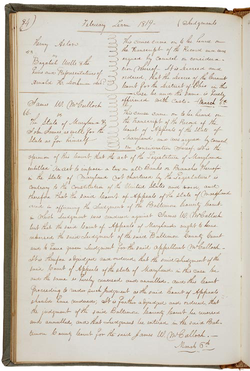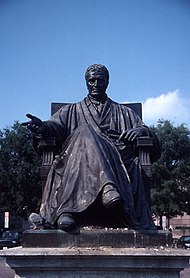John Marshall
John Marshall (September 24, 1755 – July 6, 1835) was an American statesman, jurist, and Founding Father who served as the fourth chief justice of the United States from 1801 until his death in 1835.
Encouraged by his parents, the young Marshall read widely, including such works as William Blackstone's Commentaries on the Laws of England and Alexander Pope's An Essay on Man.
[11] He was also tutored by the Reverend James Thomson, a recently ordained deacon from Glasgow, Scotland, who resided with the Marshall family in return for his room and board.
[30] In 1796, Marshall appeared before the Supreme Court of the United States in Ware v. Hylton, a case involving the validity of a Virginia law that provided for the confiscation of debts owed to British subjects.
Marshall argued that the law was a legitimate exercise of the state's power, but the Supreme Court ruled against him, holding that the Treaty of Paris in combination with the Supremacy Clause of the Constitution required the collection, rather than confiscation, of such debts.
[31] According to biographer Henry Flanders, Marshall's argument in Ware v. Hylton "elicited great admiration at the time of its delivery, and enlarged the circle of his reputation" despite his defeat in the case.
[32] Vice President John Adams, a member of the Federalist Party, defeated Jefferson in the 1796 presidential election and sought to continue Washington's policy of neutrality in the French Revolutionary Wars.
[39] Marshall supported most of the measures Congress adopted in the struggle against France, but he disapproved of the Alien and Sedition Acts, four separate laws designed to suppress dissent during the Quasi-War.
Marshall published a letter to a local newspaper stating his belief that the laws would likely "create, unnecessarily, discontents and jealousies at a time when our very existence as a nation may depend on our union.
"[40] After his return from France, Marshall wanted to resume his private practice of law, but in September 1798 former President Washington convinced him to challenge incumbent Democratic-Republican Congressman John Clopton of Virginia's 13th congressional district.
[44] His most notable speech in Congress was related to the case of Thomas Nash (alias Jonathan Robbins), whom the government had extradited to Great Britain on charges of murder.
[46] Marshall's appointment as Secretary of State was preceded by a split between Adams and Hamilton, the latter of whom led a faction of Federalists who favored declaring war on France.
His influence on learned men of the law came from the charismatic force of his personality and his ability to seize upon the key elements of a case and make highly persuasive arguments.
After coming to power, the Jefferson administration refused to deliver about half of these outstanding commissions, effectively preventing those individuals from receiving their appointments even though the Senate had confirmed their nominations.
Though the position of justice of the peace was a relatively powerless and low-paying office, one individual whose commission was not delivered, William Marbury, decided to mount a legal challenge against the Jefferson administration.
After leaving office, Burr traveled to the western United States, where he may have entertained plans to establish an independent republic from Mexican or American territories.
[110] Writing for the Court, Marshall held that Native American tribes constituted "domestic dependent nations," a new legal status, but he dismissed the case on the basis of standing.
[121] Nonetheless, historians have often praised the accuracy and well-reasoned judgments of Marshall's biography, while noting his frequent paraphrases of published sources such as William Gordon's 1801 history of the Revolution and the British Annual Register.
During his most influential period as chief justice, through the mid-1820s, he wrote nearly every decision on slavery, creating a jurisprudence that was contemptuous of free blacks and favorable to violators of the federal ban on the African slave trade.
[137] After slave revolts early in the 19th century, Marshall expressed reservations about large-scale emancipation, in part because he feared that a large number of free blacks might rise up in revolution.
In 1817 Marshall joined the American Colonization Society (Associate Justice Bushrod Washington being its national President until his death and Clerk of the Supreme Court Elias Caldwell the organization's long-time secretary) to further that goal.
[138][139] Marshall purchased a life membership two years later, in 1823 founded the Richmond and Manchester Auxiliary (becoming that branch's president), and in 1834 pledged $5000 when the organization experienced financial problems.
[146] Eventually, that led to the Supreme Court's decision in Martin v. Hunter's Lessee (1816), from which Chief Justice Marshall recused himself as an interested party (but which made him wealthy).
[126][156] Between the births of son Jaquelin Ambler in 1787 and daughter Mary in 1795, Polly Marshall suffered two miscarriages and lost two infants, which affected her health during the rest of her life.
[170] John Marshall chose to lead the expedition himself, accompanied by surveyor Andrew Alexander and crew, traveling upriver from Lynchburg, Virginia on September 1 in a 60-foot flat-bottomed batteau.
[169] Marshall concluded that the route was unsuitable for a canal due in part to rapids on the New River,[171] but the report of the commission established a path for later highways and railroads.
With his associate justices, especially Joseph Story, William Johnson, and Bushrod Washington, Marshall's Court brought to life the constitutional standards of the new nation.
In her 2011 book on Hans Kelsen, Sandrine Baume[177] identified John Hart Ely as a significant defender of the "compatibility of judicial review with the very principles of democracy."
[179] In contrast to Waldron and Ackerman, Ely and Dworkin were long-time advocates of the principle of defending the Constitution upon the lines of support they saw as strongly associated with enhanced versions of judicial review in the federal government.
[199] The university board of trustees acknowledged that "newly discovered research",[200] uncovered by historian Paul Finkelman,[201] had revealed that Marshall was a slave trader and owner who practiced "pro-slavery jurisprudence", which was deemed inappropriate for the school's namesake.



















